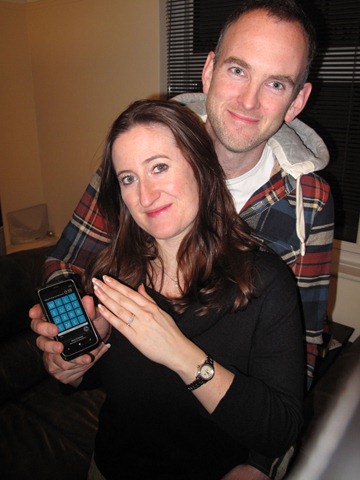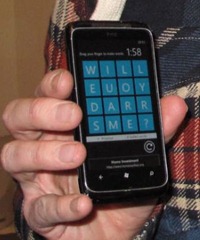You might not expect the creator of an app like Shoot Shag Marry to be much of a romantic.
But Patrick Long recently pulled off one of the most awww-inspiring—and technically impressive—marriage proposals we’ve seen in a while: He slipped his plea into a working lookalike of Wordament, his girlfriend’s favorite Windows Phone game, that he’d coded from scratch.
His feat came to light a few weeks ago, after he dashed off an email to the creators of the real Wordament. “I just wanted to thank you guys for a great game and being the inspiration for my marriage proposal,” he wrote. The email, in turn, inspired a brief post on Wordament’s official blog. Patrick was identified only by his game screen name: munkiiyebee.
We smelled a story. A Valentine’s Day story, to be specific. (How’d he pull that off? What did she think?) So we tracked down munkiiyebee and his new fiancée to find out what really went down that day. (It’s not the first time, by the way, that a Windows Phone has united a couple.)
“Big blue eyes”
Long, 37, and his girlfriend, Jenny Longman (yes, they know their surnames are oddly similar), share an apartment in the London suburb of Surrey. They met three years ago at a Christmas charity event for the homeless. Both had signed up as volunteers and were handed the same assignment: stand by the front door and greet homeless guests as they walk in.
Between arrivals, there wasn’t much to do. Patrick eventually “sidled up” to Jenny and said hello.
“I thought he was really funny,” Jenny remembers. His smile, 6-foot-3 frame, and “big blue eyes” also made a lasting impression. After a few days of back and forth on Facebook, they exchanged numbers and set up their first date.
The perfect proposal
Like most people, Patrick wanted his marriage proposal to be memorable, something that “felt like them.” He toyed with several ideas, including slipping a surprise into their regular grocery delivery. Nothing felt right.
One of the couple’s daily rituals is playing Wordament on Patrick’s phone. The hit game—only available on Windows Phone—presents players with a 4X4 letter board and gives them two minutes to spell out as many words as possible, by dragging a finger from tile to tile. Jenny, who owns an Android phone, frequently curls up with Patrick on the sofa just before bed to play. “His fingers are always in the way when I’m trying to put words in,” she says with mock annoyance.
Wordament, he realized, would be the perfect way to deliver his message. He decided to create a working lookalike app—an idea that also appealed to his inner geek (he’s a programmer by profession). “I wanted it to look as close to the game as possible.”
Recreating Wordament
He first tried taking a screenshot of the Wordament game board. “It looked like rubbish,” he says.
So one night when Jenny was out, he used Microsoft’s Expression Blend to recreate the Wordament board down to its countdown timer and ads. “Then I had to sit down with a piece of paper and figure out how to fit ‘Will you marry me?’ on the board.”
In Wordament, valid words glow when they’re traced. To achieve that effect, Patrick wrote down every possible combination he could find on his custom board—”same,” “sad,” “your,” “wed” (a happy accident)—and created a custom dictionary. When he finished, he had a list of about 20 words.
At first, the work went quickly. In a few hours he had something that looked like the real game. But then he hit a roadblock. No matter how hard he tried, he couldn’t get the finger detection to work. Eventually, he nailed it. But was his copycat app good enough to fool Jenny?
A “bizarre” request
On a brisk January evening, Patrick took Jenny to one of her favorite restaurants. She thought it was to celebrate her 35th birthday. “It was a lovely, lovely evening,” she says. They’d dressed up and lingered over their meals until 11, chatting and sipping champagne.
On the walk back to their car, just as they were crossing a street, Patrick suddenly dug into his pocket and pulled out his phone. “Let’s have a game of Wordament!” he announced.
Jenny thought the request was “bizarre”—right here in the street? And there was another problem.
“I was wearing really high heels. And I was thinking, ‘How can I hold onto the phone and concentrate on the pavement?’”
But she wanted to humor him, so she took the phone and saw the timer was already ticking down. She began tracing letters. The first word she spotted was D-A-R-E. But when she traced it, it didn’t light up.
Oops—Patrick realized he’d somehow missed that word in his custom dictionary. Luckily, Jenny didn’t seem to catch it.
Next she swiped W-I-L-L. Then M-E-?.
Then she froze.
Wordament boards, she knew, “normally don’t have question marks.” She squinted at the tiles. The clock ticked down. At last, she broke the silence.
“Does it say what I think it says?”
“Well, let’s see if you can find the words,” Patrick said. He quietly moved behind her and draped his arms over her shoulders. They traced the words together.
Once they’d highlighted them all, the Wedding March began to play—Patrick’s little improvised improvement on the real game.
He repeated his proposal aloud. When Jenny said yes, he reached into his overcoat pocket and said, “‘I guess this is for you then.” He held out a platinum ring with a diamond solitaire.
“My hands were shaking,” Jenny remembers. “I just said, ‘Put it on my finger.’”
The couple plan to marry in 2013. Jenny says she’ll be trading her Android phone for a Windows Phone well before then.
(Remember, you don’t need to create your own custom app to find love. Here are some great Valentine’s Day options in Marketplace for date planning and matchmaking.)


